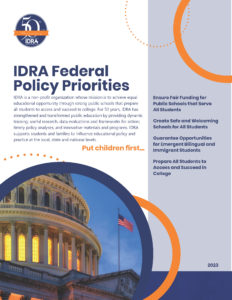• By Morgan Craven, J.D. • IDRA Newsletter • January 2023 •
IDRA’s strength lies in combining our research, training and policy advocacy expertise with the experience and expertise of students and families across the U.S. South who are working to transform their schools. We meet with policymakers and agencies, engage in coalition advocacy campaigns, and draw on our network of community partners to ensure the hopes, challenges and policy solutions of historically-marginalized communities are elevated to national policymakers. Importantly, we strive to make federal education policies and procedures more accessible to those same communities to encourage self-determination and engagement at every level.
Even as we oppose challenges to safe, welcoming and inclusive schools, including attacks on truthful curricula and the censoring of diverse identities and perspectives, a key part of our policy advocacy strategy at the federal level is to push an affirmative agenda that advances our vision for public schools and students.
IDRA works with elected officials and federal agency staff to build on our federal policy priority areas.
- Ensuring fair funding for excellent public schools for all students – Federal policies should allocate more funding to the programs that help public schools serve systemically-marginalized students, review how states and schools are spending funds to ensure equitable resource allocation, and provide incentives to increase equity in state and local school funding plans. Federal policies should not promote school structures or funding schemes that funnel public monies away from our critically-important, yet chronically-underfunded public school systems.
- Ensuring safe and welcoming schools for all students – Federal lawmakers and agency officials have an important role to play in ensuring safe and welcoming schools for all students, including by ending discriminatory and harmful discipline and policing practices in all schools; promoting stronger relationships between schools and the families and communities they serve; protecting students’ civil rights; encouraging the use of research-based school climate programs; explicitly fostering culturally-sustaining instructional pedagogy and practices; requiring frequent and detailed data reporting; and increasing the number of diverse, highly-qualified school-based mental and behavioral health professionals.
- Guaranteeing opportunities for emergent bilingual students and immigrant students and families – Lawmakers should allocate more money for federal grant
programs and agency offices that support emergent bilingual students, including teacher preparation, recruitment, and retention strategies, technology and instructional materials, and meaningful family engagement.
- Preparing all students to access and succeed in college – Federal policymakers should allocate more resources to support college preparation programs, counseling and access to advanced coursework for students who are under-represented in higher education.
As we pursue these priorities over time, we look forward to focusing our attention on specific issues during the 118th Congress, including the following.
IDRA supports a suite of discipline and school climate bills designed to end the use of harmful discipline and policing practices in schools and create programs that encourage the use of research-based school climate strategies, like restorative practices.
These bills include the Protecting our Students in Schools Act, which would end corporal punishment in schools that receive federal funding, and the Counseling not Criminalization in Schools Act, which would end federal funding for school-based law enforcement. Both pieces of legislation would create grant programs to increase the use of research-based school climate programs and increase training for school personnel.
IDRA has joined coalition partners to support these and other school climate and discipline bills and has presented expert testimony to Congress on discipline and school safety issues (Craven, 2022; Federal School Discipline and Climate Coalition, 2021).
IDRA pushes for more funding and programmatic support for schools and programs that serve emergent bilingual students. Emergent bilingual students are a large and growing population of our public school students who bring considerable knowledge and skills to their classrooms. Federal lawmakers and agencies must support these students and promote learning environments, policies, educator supports and family engagement practices that truly meet their needs. We will always support increasing funding for federal grant programs and expanding the capabilities of the offices in the U.S. Department of Education that support emergent bilingual learners.
IDRA pushes for transparency in federal data collection. One of the key roles of federal lawmakers and agency officials is to collect, publish and review data to ensure compliance with federal laws, including civil rights protections for students. It is difficult to be responsive to students’ needs across the country if we are unable to identify how they are being impacted by policies and practices in a timely manner. We will continue to support a robust, comprehensive data collection and publication, including of the federal Civil Rights Data Collection, and push for appropriate responses from federal and state actors.
IDRA supports expansion of early college high school programs. Well-supported and well-executed early college high school programs have expanded college access and success for systemically-marginalized students. IDRA has long supported these programs at the local and state levels and published research on the efficacy of one such program in the Pharr-San Juan-Alamo school district in Texas (Bojorquez, 2019). Federal funding and programmatic support for these models will enable them to grow across the country.
For more information about IDRA’s federal policy priorities, sign up for our policy alerts (www.idra.org).
Resources
Bojorquez, H. (2019). College Bound and Determined. IDRA.
Craven, M. (February 16, 2022). Serving All Students – Promoting a Healthier, More Supportive School Environment, written testimony presented to the U.S. House Committee on Education and Labor Early Childhood, Elementary and Secondary Education Subcommittee.
Federal School Discipline and Climate Coalition. (October 26, 2021). Re: 205 Organizations and Individuals Call for Action on a Suite of Bills to Address Systemic Racism, Policies and Practices that Harm Black and Brown Students and Youth in Schools, joint letter.
Morgan Craven, J.D., is the IDRA national director of policy, advocacy and community engagement. Comments and questions may be directed to her via email at morgan.craven@idra.org.
[©2023, IDRA. This article originally appeared in the January 2023 issue of the IDRA Newsletter by the Intercultural Development Research Association. Permission to reproduce this article is granted provided the article is reprinted in its entirety and proper credit is given to IDRA and the author.]



